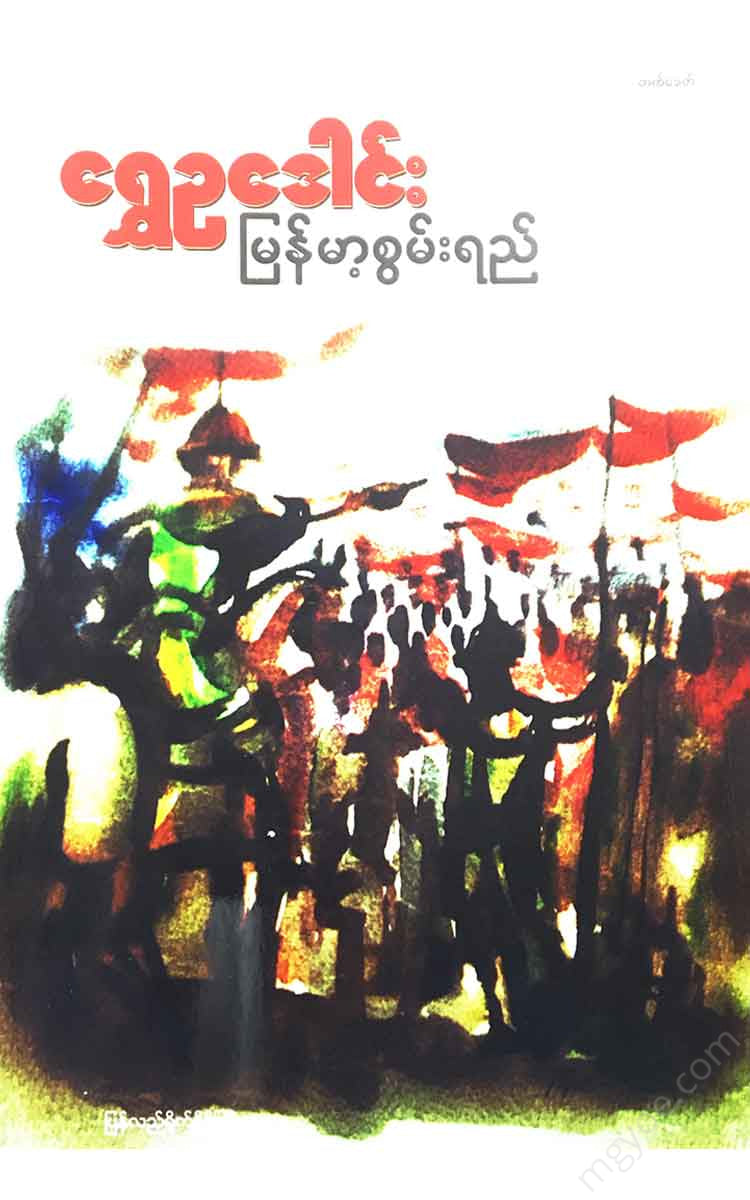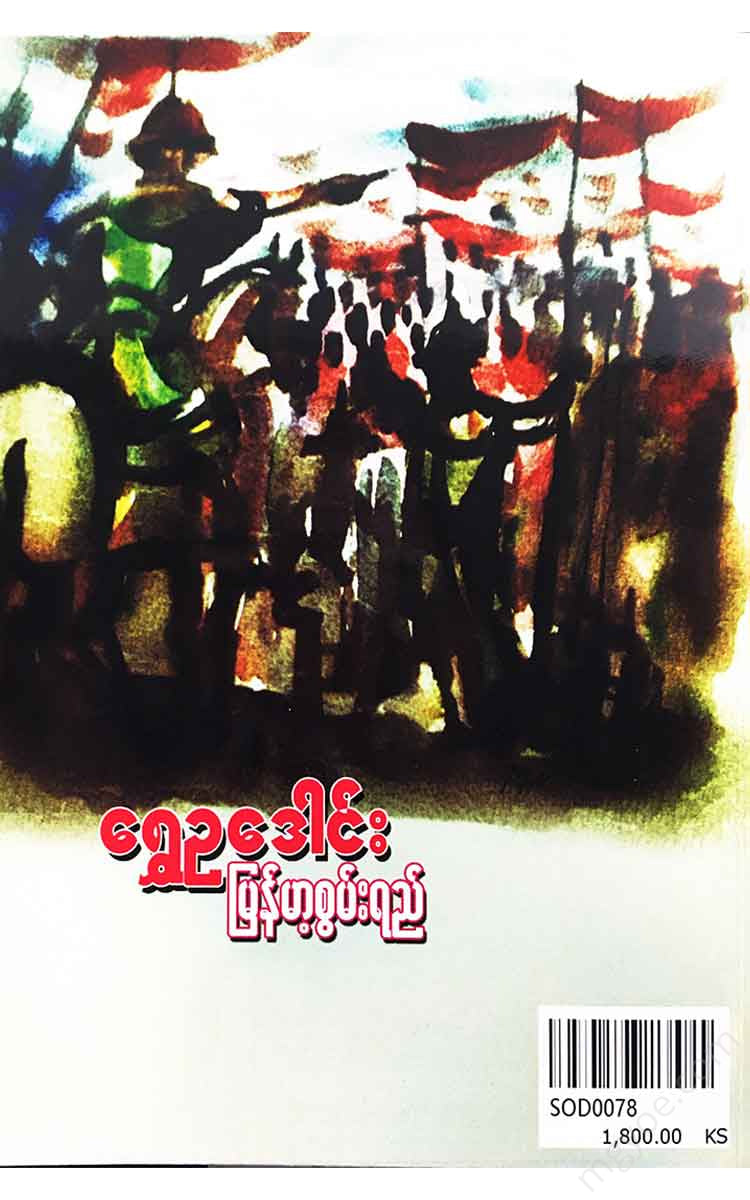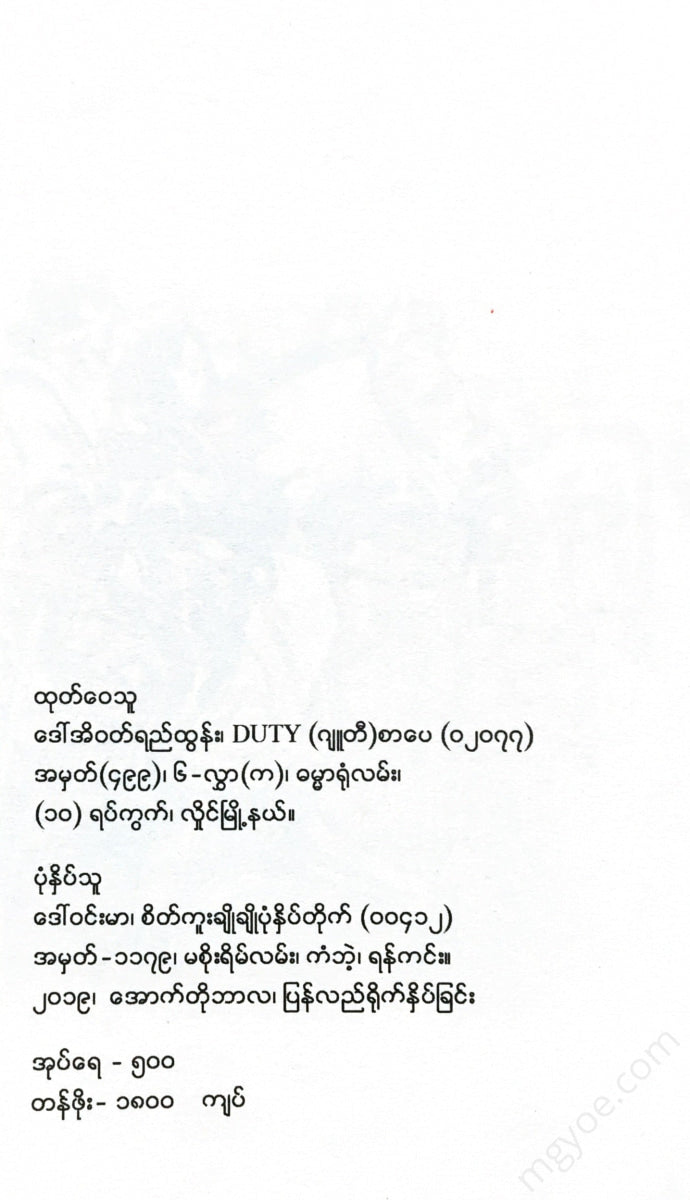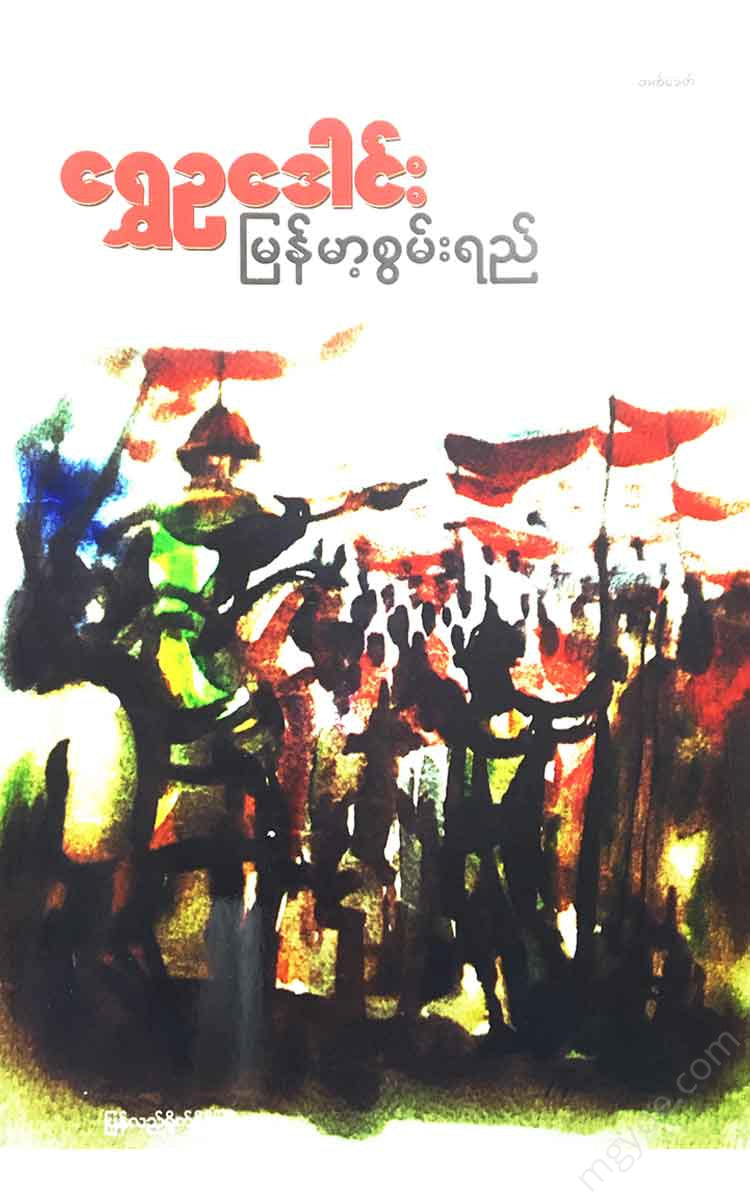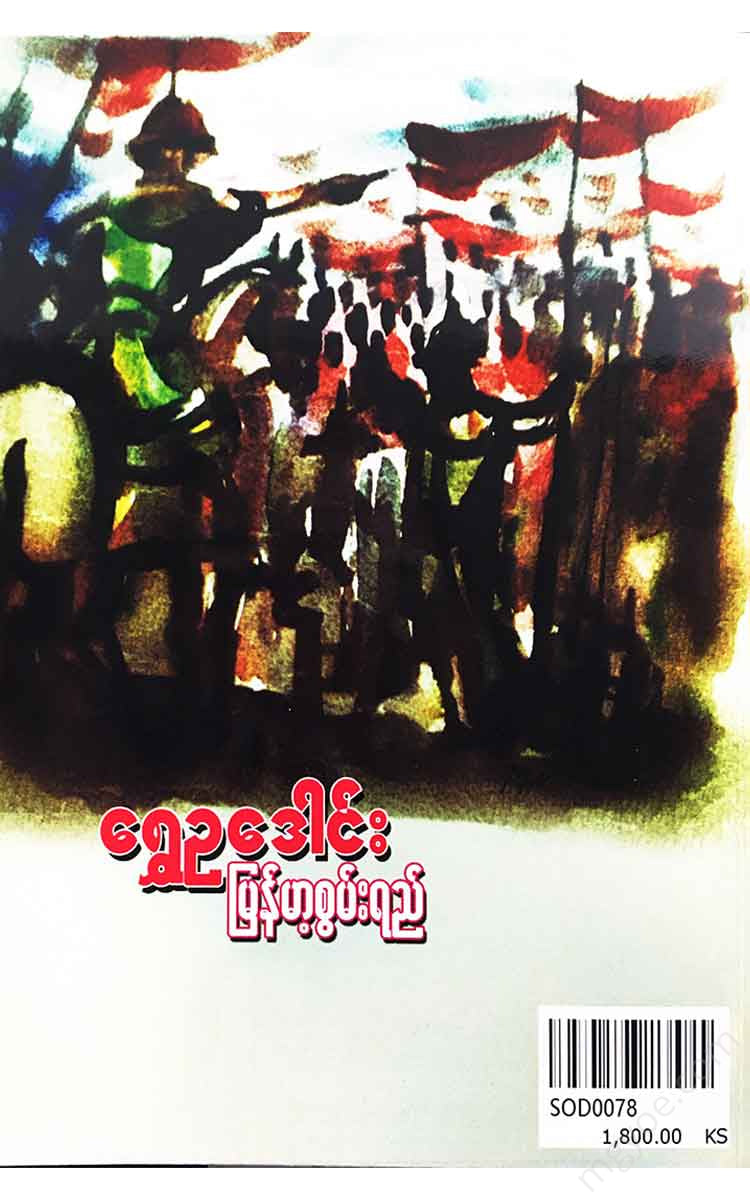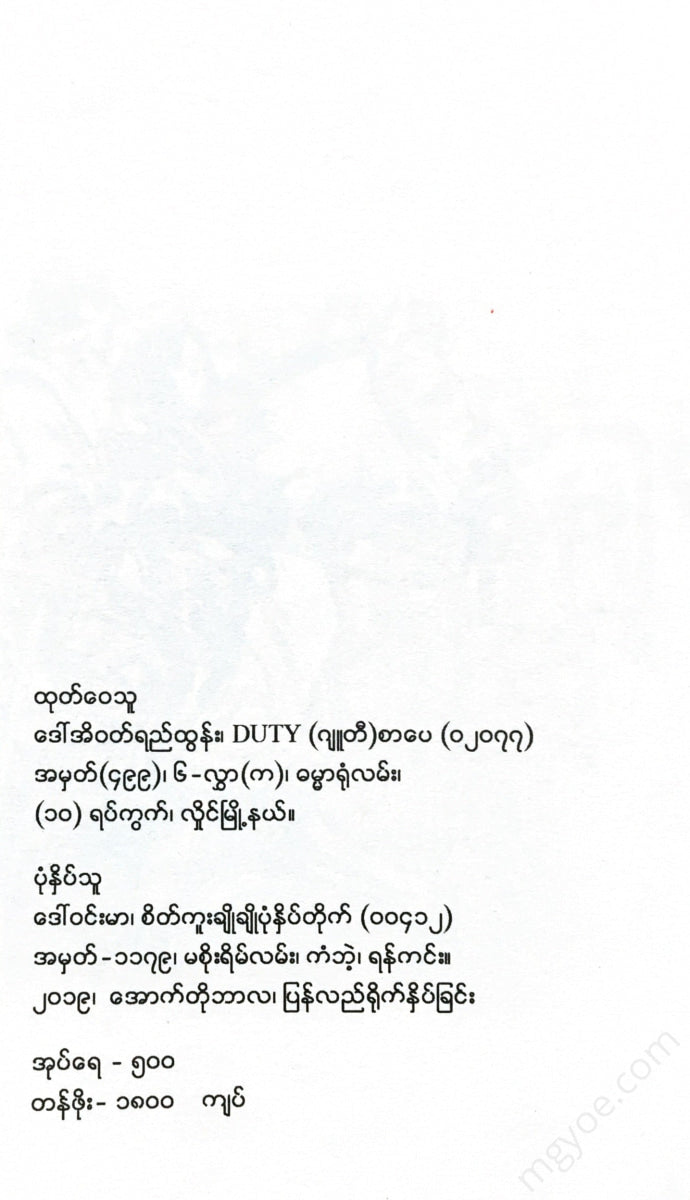စိတ်ကူးချိုချိုစာပေ
Golden Peacock - Myanmar Talent
Golden Peacock - Myanmar Talent
Couldn't load pickup availability
Myanmar talent
[ 1 ]
In the year 1237 of the Burmese calendar, Prince Myungkun attempted to abdicate the throne of his father, King Mindon, when his horsemen appeared south of Shwebo. One day, at 9 o'clock in the morning on the full moon day of Tabaung, near the village of Mangyeton, which is called "Myin Nel", a large pagoda festival was being held. A group of villagers from nearby villages were dancing and playing drums, pots, and drums, playing more than he could.
The young women of the Kalyan region, dressed beautifully in traditional Kalyan attire such as Puti Naw Za and Zee Phyu Kone, were praising which village was the best at playing the Doe Patti, which Kalyan woman was the best at dancing, which village was the best at playing the pot, etc. At 9:30, all the pilgrims who had come to the pagoda festival were in a state of shock.
The reason for this was that the Shwebo Governor and his wife arrived on a large, six-foot-tall cart, adorned with a white bull, all of the same size and white, with ornaments such as a top hat, a crown, and other ornaments. At the side of the cart, a handsome and stately young man of about 25 years old, wearing a turban and a shawl, rode briskly on a large, flowing robe. He was the governor's son, Khin Maung Oo.
The governor's carriage stopped under a tree, and Khin Maung Oo looked up at the crowd of pilgrims. Not far away, he saw a cart with a large red cow under a tree. He drove his horse towards it, and greeted a young woman and an old woman sitting in the cart with a smile that seemed familiar.
The people sitting on the cart were Daw Nyein Khin and her niece Ma Nan Nwe from Thakhutaw village. Daw Nyein Khin was famous for her wealth in fields, rivers, streams, gold, silver, and jewels, and her niece Ma Nan Nwe was also famous for her beauty and beauty. | Khin Maung Oo had just finished talking to Daw Nyein Khin and her two nieces, when a disciple of the town minister blew a trumpet and gave the signal, all the spectators gathered in a crowd and came out of the temple premises. It was none other than the great archery competition.
This area was the area where most of the soldiers who served in the military appeared, and since they were especially fond of military practices, at the festival held once a year, all the people of that area used to hold a great archery competition.
The winner of the competition was traditionally crowned with a garland at the end of the event, either by the governor's daughter or, if the governor had no daughter, by a young woman chosen by many as the most beautiful and handsome in the area.
The archery method is to make a cork like a bird's nest at a distance of about two hundred cubits, and then hang it from a pole with a small rope. The archers take turns shooting with the arrows they have brought. The archer who misses the target is eliminated from the competition, and only the archers who hit the target continue to compete. In the end, the archer who scores the most points wins.
As soon as the trumpet was blown, the contestants, armed with their bows and arrows, went out to the designated shooting range, and each one aimed at a single target.
About twenty of the villagers had fired, but none of them hit the bird, only missing it by a few strokes. A young man, about twenty-five years of age, wearing a loose cloth around his waist and with his hair tied in a bun, and who was very different from the other villagers in manner, appearance, and dress, came out of the crowd with a bow in his hand and a very handsome appearance. He aimed at a bird for just a moment and released the arrow, which landed squarely in the center of the bird.
Then, the arrow hit the target for the first time, and the city minister and the entire audience clapped their hands and gave a loud applause.
However, there were still many archers who had not yet fired, so they each fired... When all the archers were gone, only one more wild man hit the bird.
Then Daw Nyein Khin and her relatives were talking to the mayor's son, Khin Maung Oo.
" Even though you are the governor's son, you don't know how to shoot a bow and arrow...
He refused to be persuaded, so he borrowed a bow and arrow from a forest dweller, got off his horse, went to the shooting spot, aimed a little, and fired. The arrow hit the bird and stayed there.
This is because in the first round, only three archers hit the bird, so in the second round, the tradition is that those who can hit the bird are drawn first, second, third, and so on, and then they take turns shooting according to the traditional method of drawing lots.
When the lot was cast, the young man of the forest was chosen to shoot first. He went out to the shooting range again, looked at the bird carefully, and then released the arrow. Then, the bird moved because of the wind of the arrow, and it brushed close to him, but the arrow did not hit the bird, and the young man of the forest had to leave the competition with a sad face.
Then the boy with the bare head was chosen to shoot second, so he came out holding the bow, aimed easily, and released the arrow. The arrow hit the center of the target again, just as before, and the audience applauded and praised him.
Then Khin Maung Oo, who had been chosen to throw the third shot, was given even more applause, as he was the son of the governor. Now that only two competitors remained, the boy with the naked body, thinking that he would not win the contest, took his horse, which he had entrusted to a disciple, and jumped on it, and galloped to the shooting spot. As soon as he reached the shooting spot, he let go of the reins, turned sideways from his horse, and released the arrow, which hit the bird a third time.
Then Khin Maung Oo jumped on his horse and tried to shoot in the same way. His friends said that he could shoot from a horse without any rules, and that he could shoot from a foot position, but he refused to give in. Khin Maung Oo galloped his horse and shot again like a child. The horse was not used to it, and just as he was about to shoot, it went sideways, and the arrow missed the bird.
Then, when the boy with the bare feet said that throwing from a horse was not the custom that many people used, they should set aside their hits and continue the competition only on foot. All the audience praised the boy, saying that he had a great spirit.
Then Khin Maung Oo told Bala Pusoy and the boy that if he had a good horse that could be trained like his horse, he would enjoy shooting on horseback. Bala Pusoy and the boy replied that if Khin Maung Oo wanted his horse, they could exchange horses and shoot on horseback.
Then Khin Maung Oo knew that if he had won after changing horses, the audience would not have praised his skill much, but he was still ashamed to give up at once, so he gave up for the sake of the competition. However, if the boy and the naked man did not object, he would still like to change horses and compete for fun.
Then, the empty cloth and the boy replied that they agreed as Khin Maung Oo had said, and they exchanged vows. Khin Maung Oo rode the empty cloth and the boy's horse and, in the same old way, released an arrow, but it missed the bird.
It so happened that if Khin Maung Oo lost the competition, he would ride to the boy with a bare back and a bare back, with the expression on his face that it didn't matter whether he won or lost the four games, which were the joy of the mountaineers.
However, knowing that if he showed any signs of anger or unwillingness to accept defeat in the competition, the audience would mock him for being too stubborn, so he changed horses with a smiling face and said that he had thought that he had won because of the horse at first, but now that he had changed horses and was riding and shooting, he frankly admitted that he had lost not because of the horse but because of the strength of the man. Then he jumped on his horse and left the archery competition to Daw Nyein Khin and her friends.
Then, many spectators praised the boy with the naked body who had won the archery competition that day, saying, "He is a good boy. He is a good shooter, he is a good runner, he is a good person, he is also a good person, and he is kind." Then, they asked each other about who the boy was, what village he was from, whose son he was, and so on.
Then, those who knew him told him that the boy was originally from Mandalay and that his parents had died when he was young, so he was living with his uncle, U Tun Pyae, in Hla Taew Sha. The audience also learned about his lineage.
Then the archers, not grieved at their defeat, but rejoiced that such a man, who seemed so civilized and noble-minded, had won. They surrounded the boy, made friends with him, and, as was customary, took him to the governor.
The mayor was more pleased that a boy with a noble appearance and a noble spirit had won the competition than that his son had lost. When he asked what tribe and village the boy was from, he learned that the boy was Maung Tun Nyunt, the nephew of U Tun Pyae from Hla Taw village.
Then the governor praised the boy and gave him a hundred bundles of silver as a reward. Then the villagers carried the boy to the cart of the Ma Nan Nwe family and went.
Ma Nang Nwe got down from the cart and placed a garland of jasmine buds around Maung Htun Nyunt's neck. Whether it was because the boy and girl were young and shy, or because they were shy for some other reason, I don't know. When Khin Maung Oo, who was watching from a distance, saw both of them walking awkwardly and looking shy, he bit his lip in a sign of envy.
After that, Maung Tun Nyunt and two of his acquaintances went around to see the various events being held at the pagoda festival, and Khin Maung Oo introduced Daw Nyein Khin Tu Wri to his parents.
